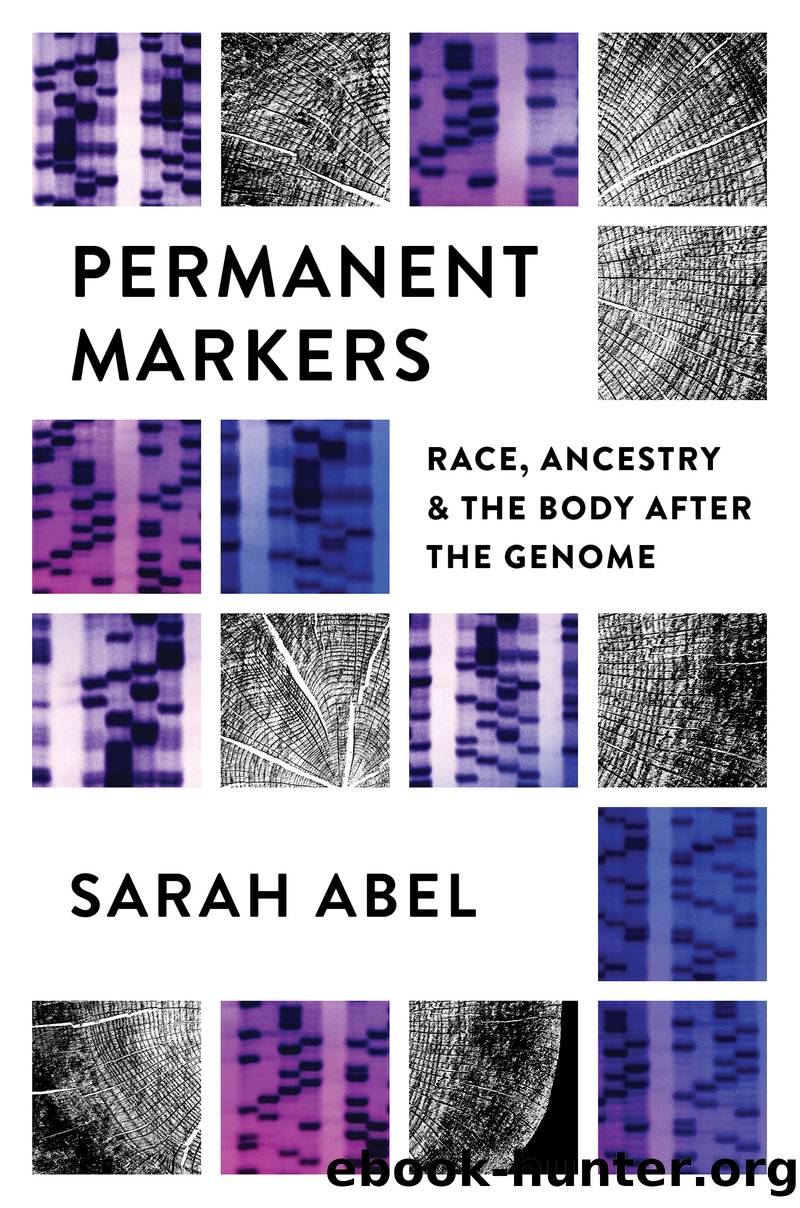Permanent Markers by Sarah Abel;

Author:Sarah Abel;
Language: eng
Format: epub
Publisher: University of North Carolina Press
Robertsâs statement underlines how focusing on deconstructing beliefs of ancestral purity as the linchpin of antiracist action can create blind spots about how structural conditions (e.g., class inequalities) contribute to the reproduction and intensification of socially engineered racial distinctions, which in turn reinforce societal beliefs that these differences are ânaturalâ and âinnate.â As Roberts identifies, the solution to these problems requires not only ideological shifts but also (and principally) political and economic action. As an expression of personal commitment, Roberts draws a moral distinction between knowing about oneâs mixed ancestry and making it the focus of oneâs public identity.
The strategic cultivation of Black identities among biracial children (who could feasibly have access to different âethnic optionsâ) has been framed elsewhere by France Winddance Twine as a form of âracial literacyâ: a set of âpractices that resist racial hierarchies that privilege whites and people of multiracial heritage over blacks in a context in which the boundaries between blackness and whiteness are permeable.â43 Many of the Black U.S. and Brazilian test-takers I interviewed demonstrated their own racial literacy by pragmatically affirming the salience of their existing racial identities over their DNA ancestry portraits, based on their understanding of how racism continues to operate in these societies. As Jessica, a U.S. college student, put it: âI self-identify as African American. I identify as such because genetically I am predominantly African American, not to mention that, when people see me, they automatically assume I am African American. Just because I have European blood in me does not mean that people wonât see me a certain way, thatâs just how it is. Thatâs the bad part about self-identification; just because you see yourself that way doesnât mean the world will.â
Nonetheless, some Black and mixed-race interviewees indicated that they saw their DNA ancestry reports as a way of opening up certain âethnic optionsâ within Blackness, at a moment when cosmopolitanism and multiethnicity are increasingly valued.44 Hasan, a financial executive who had taken several DNA tests to try and deepen the scope of his genealogical research, told me that he also wanted his children to âhave a sense of where they came from outside of slavery.â In addition to gaining information about their African ethnic origins, he felt that the admixture tests offered them âa larger view of the world and their place in itâthey are citizens of the world, to borrow the quote. My wifeâs parents are from Jamaica and Cuba, and their recent ancestry includes Chinese, Native American, England, and African in high percentages. So the world is really them.â Others found that the diverse categories in their admixture reports were good for striking up new friendships or strengthening cultural affinities. For instance, one test-taker reported that after discussing his newfound âJewishâ genetic ancestry at his workplace, a Jewish colleague had invited him for dinner with his family, and they had since become firm friends. Similarly, a Mexican American test-taker who found she had a small percentage of âMiddle Easternâ DNA said that on hearing
Download
This site does not store any files on its server. We only index and link to content provided by other sites. Please contact the content providers to delete copyright contents if any and email us, we'll remove relevant links or contents immediately.
| Africa | Americas |
| Arctic & Antarctica | Asia |
| Australia & Oceania | Europe |
| Middle East | Russia |
| United States | World |
| Ancient Civilizations | Military |
| Historical Study & Educational Resources |
Never by Ken Follett(2878)
The Man Who Died Twice by Richard Osman(2297)
Machine Learning at Scale with H2O by Gregory Keys | David Whiting(2285)
Fairy Tale by Stephen King(2063)
Will by Will Smith(2040)
Rationality by Steven Pinker(1764)
The Dawn of Everything: A New History of Humanity by David Graeber & David Wengrow(1570)
The Dark Hours by Michael Connelly(1566)
Principles for Dealing With the Changing World Order: Why Nations Succeed and Fail by Ray Dalio(1373)
Friends, Lovers, and the Big Terrible Thing by Matthew Perry(1327)
A Short History of War by Jeremy Black(1299)
HBR's 10 Must Reads 2022 by Harvard Business Review(1253)
Go Tell the Bees That I Am Gone by Diana Gabaldon(1233)
Can't Hurt Me: Master Your Mind and Defy the Odds - Clean Edition by David Goggins(1226)
515945210 by Unknown(1207)
Fear No Evil by James Patterson(1107)
443319537 by Unknown(1071)
Works by Richard Wright(1018)
Going There by Katie Couric(991)
